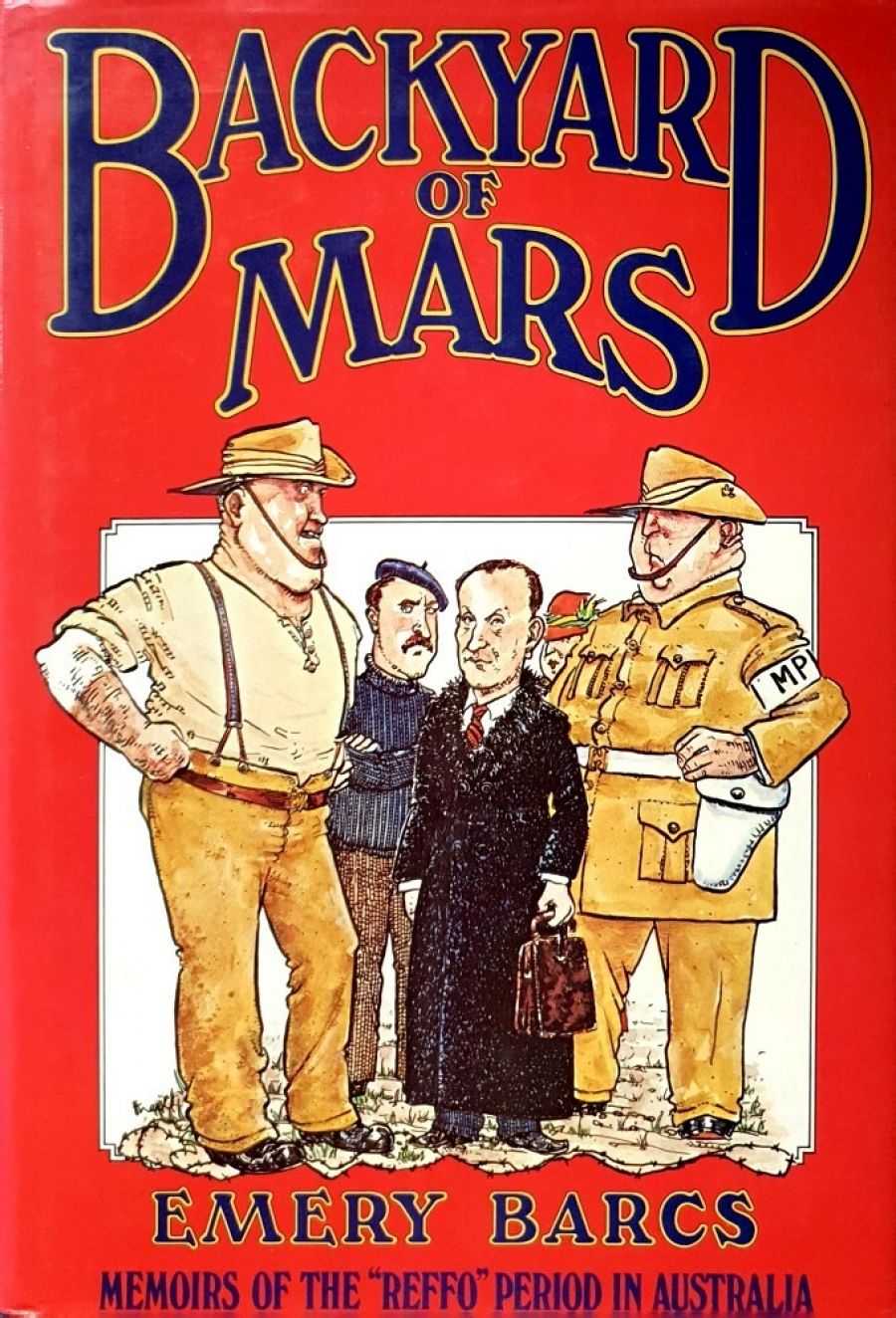
- Free Article: No
- Contents Category: History
- Review Article: Yes
- Article Title: A Refugee Calls
- Online Only: No
- Custom Highlight Text:
This is Emery Barcs’ autobiographical account of his early years in Australia. The bulk of the book deals with the time from his arrival in August 1939 until his discharge from the Australian Army in (according to my reckoning) October 1944. The book is divided into three sections - corresponding to the three distinct episodes Barcs experienced during this period. The first, entitled ‘Nobody Owes You a Living’, deals with Emery Barcs’ attempt to make a living in Australia in the phoney-war period.
- Book 1 Title: Backyard of Mars
- Book 1 Subtitle: Memories of the ‘Reffo’ period in Australia
- Book 1 Biblio: Wildcat, 227pp, $14.95pb
- Book 1 Cover Small (400 x 600):

- Book 1 Cover (800 x 1200):

It portrays well the insularity of Anglo-Saxon Australia of those years; its callous resentment of foreign-speaking, foreign-looking outsiders. The early war years were the time when reffos and dagoes who attempted to enlist in the Australian Army (as Emery Barcs tried to do in October 1940) were told by the recruiting sergeant: ‘We don’t need your sort’.
Soon after Pearl Harbour Emery Barcs was interned in Liverpool and Tatura for about three months. The second section on ‘His Majesty’s most loyal internees’ contains a good description of the, at times, humorous incidents of life behind barbed wire in Australian internment camps. In Tatura Emery Barcs met some of the Dunera internees and gives us some of the more lurid stories of that ship - true stories but which nevertheless convey the impression of too much terror and harassment The journey was exceedingly unpleasant but the term ‘hell-ship’ is hardly justified – when compared to the much more spectacular examples of cruelty to prisoners of war and, internees which were perpetrated constantly at that time elsewhere in the world.
Part 3 – entitled ‘Backyard of Mars’ – deals with Emery Barcs’ short period in civilian life after internment and with his army experiences in an Employment Company for some 2¼ years after July 1942. By early 1942 civilian life for friendly aliens had changed. They Were subject to some (unenforced) mobility restrictions; more importantly, shortages of labour and of skills of all kinds helped to break down ‘that unwanted’ feeling so well documented in Part I. Barcs’ army career was similar to that of many non-combatants who chafed under the red tape and occasional venality of those higher up the command structure. Whilst in the Army (mostly in Sydney loading and unloading army supplies) Emery Barcs managed to prepare the odd broadcast for the ABC. In the course of one of these he likened the May 1943 Luftwaffe raids on London and East Anglia to the brutal assault of the Nazi airforce on ‘Guernica during the Spanish Civil War. Archbishop Gilroy (as he then was) protested to the ABC that the destruction of Guerilica was caused by ‘exploding-mines which were unscientifically laid [presumably by Spanish Government troops], to cut roads’.
A very brief. Epilogue deals with Emery Barcs’ subsequent journalistic career, There is justified reference to the ‘peaceful mental revolution’ which has changed many Australian post-war attitudes to, non-Anglo-Saxons in their midst. While there is a great deal of truth in this account, there is also a good deal of smugness. Barcs had managed, by hard work, to make an economic success of his life (and now lives in ‘leafy Killara’ and has been able to accumulate some worldly possessions). There is little recognition that discrimination against other groups (particularly, but not only, Aborigines) may still prevent hard work from paying off in comfortable living conditions. The book is somewhat too long and discursive and would have benefited from an index. However, it provides a readable account of the ‘reffo’ period in Australian history.


Comments powered by CComment